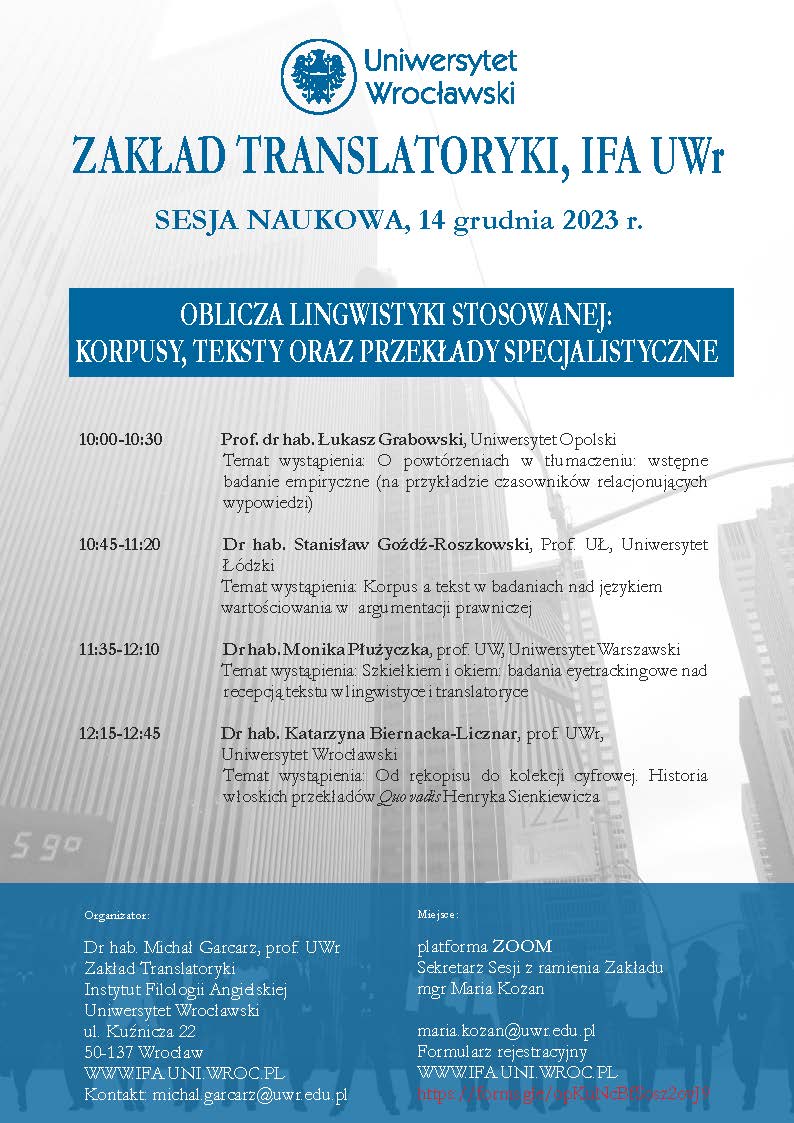The Department of Translation Studies of the Institute of English Studies at the University of Wrocław invites everyone interested to the scientific session entitled „OBLICZA LINGWISTYKI STOSOWANEJ: KORPUSY, TEKSTY ORAZ PRZEKŁADY SPECJALISTYCZNE” (“DIMENTIONS OF APPLIED LINGUISTRY: CORPUSES, TEXTS AND SPECIALISED TRANSLATIONS”), which will begin on Thursday, 14 December from 10:00 on the ZOOM platform.
We encourage all interested people to check out the event page and sign up for the scientific session. We warmly invite you!
dr hab. Michał Garcarz, prof. UWr and mgr Maria Kozan
Event programme
10:00-10:35 – dr hab. Stanisław Goźdź-Roszkowski, prof. UŁ, University of Lodz
Speech topic: Korpus a tekst w badaniach nad językiem wartościowania w argumentacji prawniczej
10:50-11:25 – dr hab. Monika Płużyczka, prof. UW, University of Warsaw
Speech topic: Szkiełkiem i okiem: badania eyetrackingowe nad recepcją tekstu w lingwistyce i translatoryce
11:40-12:10 – dr hab. Katarzyna Biernacka-Licznar, prof. UWr, University of Wrocław
Speech topic: Od rękopisu do kolekcji cyfrowej. Historia włoskich przekładów Quo vadis Henryka Sienkiewicza
12:25-12:55 – prof. dr hab. Łukasz Grabowski, University of Opole
Speech topic: O powtórzeniach w tłumaczeniu: wstępne badanie empiryczne (na przykładzie czasowników relacjonujących wypowiedzi)
Biographies of speakers:
Dr hab. Katarzyna Biernacka-Licznar, prof. UWr, University of Wrocław – literary scholar and an Italian philologist, professor at the Institute of Classical, Mediterranean and Oriental Studies of the University of Wrocław. Her research interests include translation of children’s and young adult literature, reception of Italian children’s and young adult literature in Poland, and specialised translation. Co-founder and member of the Centre for Research on Children’s and Young Adult Literature at the University of Wrocław. Co-founder and secretary of the editorial board of the journal Italica Wratislaviensia. Author of publications on the reception of Italian literature in Poland and Polish literature in Italy, including 120 lat recepcji Quo vadis Henryka Sienkiewicza we Włoszech (2020), Serce Pinokia. Włoska literatura dla dzieci i młodzieży w Polsce w latach 1945-1989 (2018). Head of two research projects: Miejsce Quo vadis w kulturze włoskiej. Przekłady, adaptacje, kultura popularna, NPRH (2016-2020); Status przekładu w polisystemie peryferyjnej literatury dziecięcej. Perspektywa porównawcza na przykładzie literatury włoskiej i polskiej”, NCN (2011- 2014).
Dr hab. Stanisław Goźdź-Roszkowski, prof. UŁ, Uniwersytet Łódzki – head of the Department of Specialised Languages and Intercultural Communication. His research interests focus on discourse analysis and specialised genres, phraseology, argumentation and legal rhetoric. He is the author of numerous publications in this area, including Phraseology in Legal and Institutional Settings. A Corpus-based Interdisciplinary Perspective (Routledge 2018), Law, Language and the Courtroom. Legal Linguistics and the Discourse of Judges (Routledge 2022), Language and Legal Judgments. Evaluation and Argument in Judicial Discourse (Routledge 2024). He directs the National Science Centre grant „Wyrażanie ocen i negocjowanie postaw w uzasadnieniach wyroków Sądu Najwyższego Stanów Zjednoczonych oraz Trybunału Konstytucyjnego w Polsce. Perspektywa konfrontatywna”.
Prof. dr hab. Łukasz Grabowski, University of Opole – linguist (English), conducting research in the fields of translation studies, formality, specialised languages, and corpus linguistics. He currently works at the Institute of Linguistics at the University of Opole; previously he also worked at the University of Ostrava (Czech Republic) and in corpus projects, among others at the University of Lodz and Aston University in Birmingham (UK). In addition to two monographs and three edited volumes, he has published the results of his research in several leading academic journals (e.g. English for Specific Purposes, International Journal of Corpus Linguistics, International Journal of Lexicography, Across Languages and Cultures, Perspectives: Studies in Translation Theory and Practice), as well as in collected volumes published by, among others, John Benjamins, Emerald, Springer and Language Science Press). He also has work to his credit as a leader and contractor on grants funded by the National Science Centre (NCN), devoted, among other things, to the description of lexis and phraseology in English pharmaceutical texts. In 2013, he won a postdoctoral fellowship at the Centre for Advanced Research in English at the University of Birmingham, and in 2019 he was again conducting research there, this time on translation, under a Bekker Fellowship (NAWA). He is a member of the scientific advisory board of several journals, including English for Specific Purposes and Applied Corpus Linguistics.
Dr hab. Monika Płużyczka, prof. UW, Uniwersytet Warszawski – is head of the Department of Translation Studies at the Institute of Specialised and Intercultural Communication and the Laboratory for Experimental Eye Tracking Linguistics (LELO). In 2016, she was awarded a postdoctoral degree on the basis of the first Polish monograph on eyetracking research in translation studies, as well as on a vista translation (2015). She has worked closely with the Johann Gutenberg University Mainz, Germany (postdoc and guest professorship). She is co-founder with foreign partners of the international research, teaching and training consortium ELIT, within which she co-organises international interdisciplinary doctoral studies (double degree). International grant holder, e.g. “Eye-Tracking-Analysen beim Vom-Blatt Dolmetschen”, “Translaton”, “Empirical study of Literature Training Network” (2020- 2025) in the framework of the EC Horizon 2020 programme. Author of numerous publications in the field of translation studies and linguistics, translator for Russian and translator for German. Deputy editor of the journal “Kwartalnik Neofilologiczny” published by the Polish Academy of Sciences and thematic editor of the journal “Applied Linguistics Papers”. Her research interests focus on the mental processes determining the act of translation, as well as their neurobiological determinants.





